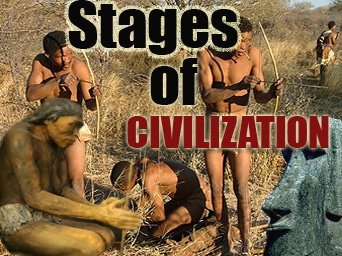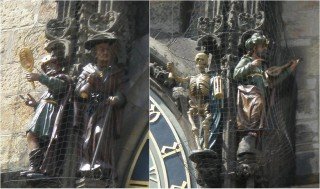
The ideals of courage, honor, duty, and social cohesion that drive societies to adapt and survive have been replaced with hedonism, greed, and self interest. No society composed of these disruptive virtues has ever managed to reconstitute itself.
by Jack JC
In order to place some perspective into the behaviour patterns of leaders, it might be useful to visualize society in a series of stages, rather like the development of a stone age tribe into a great empire and then collapsing.
As human beings we are only about 6,000 generations out of the caves and although there has been a mighty leap in technology since that time period, has our mental capacity evolved in any significant manner? So let us imagine, for a moment, that we are observers in time, watching an empire grow from the humble beginnings of a hunter-gatherer tribe.
In the hunter-gatherer stage, the tribe has no set home. They may have an area that they wander around in, changing from hunting ground to hunting ground as game grows scarce or wary. The men hunt and defend the tribe and the best hunter is the overall chief.
The women gather roots and berries, care for the children and are probably the tribal healers and shaman. Yes, I know some women would also hunt, and there is a good probability that a man would be healer or shaman.
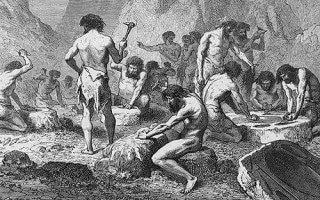
What is more important is the mentality that these people have. They live from day to day, they worship gods that are most likely the result of natural phenomena. They are hardy, muscular specimens, as the sickly, unlucky, or weak individuals die young.
They probably have a somewhat fatalistic view on life as they have little control over their environment except for fire. Energy is expended only as necessary, there is no time for politics or intrigue.
Equipment and possessions are kept to a minimum as they must be carried from camp to camp. The community would be a close knit group, with small petty rivalries, but in general as all depend on each other to survive the honesty and trust level would be pretty high.
History would be oral. A person at this level would aspire to have a full belly every night, and security. These two driving forces would most likely be the primary driving factors in their decision making, alongside the normal human urge to mate.
As the tribe develops, they discover planting. Now they no longer have to move, possessions become more important and more permanent – perhaps a wattle and daub hut to keep out rain and cold, some baskets or pottery to store meat and grain in.
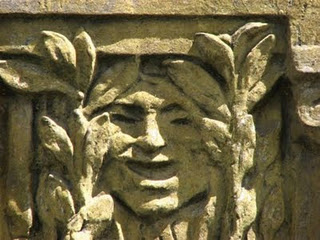
Now the seasons become important, the farmer studies when is the best time to plant, what is the best ground, how to produce more grain. Some of the tribe may discover they are better basket weavers than farmers – trade and commerce based on the barter system become prevalent.
As the tribe grows, grain is apportioned under the control of the chieftain for use during famine. It becomes very important to keep the natural gods happy to ensure good crops, so it is possible an organized religion starts to spring up, based on the teachings of the local shaman.
The underpinnings of organized society appear. The tribe still cooperates in common matters; defense, communal structures like a palisade or granary, and so forth. Perhaps the first attempts to write down thoughts happens at this stage as there is some leisure time available that was previously impossible in a hunter-gatherer society. Perhaps we would see the beginnings of cultural events like dancing and maybe even some relatively crude experiments.
These people would be driven to keep the gods happy, defend their structure and keep their hard won possessions, their stored food and seeds. They would have a good understanding of the local weather conditions and seasons.
The primary drivers in their decision making would be maintain the status quo, and expand their food supply. They would still be hardy specimens, but if food supply is expanding there would be some provision for the aged, providing a source of sages. We could label these people early agrarian.As food sources improve through irrigation and a better understanding of the science of growing, the population expands with access to better nutrition.
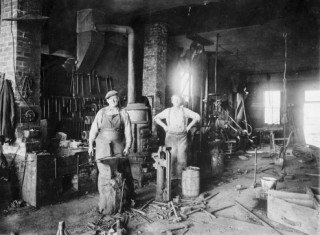
Science and religion would become more firmly established, now people are watching the stars to herald the seasons and foretell events.
There would be an advanced barter or monetary system, probably organized state taxes and laws, and the early agrarian village has now risen to a town.
With a rising tradesman class goods become more plentiful, wealth and leisure become pursuits. With wealth comes greed and desire, and we may see the starting of raids on other villages to gain more wealth, slaves or needed minerals. This pushes the need for stronger walls and guards. A strong warrior class might arise, and people learn about metals.
People in this stage are driven by desire to expand their wealth, land, or prestige. They have developed a working societal system which gives them pride, but they have some fear of their neighbours whom they may have raided or be expecting a raid from. We can refer to this as a late agrarian society.
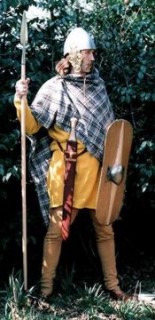
As technologies develop fewer farmers can provide more food, a burgeoning population is busy in metalworking, woodworking and a thousand other trades. The priests or government collect taxes in the form of money, goods, or food, storing the food against famine. The town becomes the center of a religious, scientific, and cultural flowering.
The warrior class has morphed to a standing army to do the bidding of the rulers. It is possible that cottage industries employ labourers or slaves making common goods as in a casting operation, or pottery. There may be functioning sewers and a common aqueduct for water supply.
Defensive walls are now high and thick, but as the people know that their culture is strong, warfare becomes more prevalent. The rulers may decide to conquer the most troublesome or richest neighbour to ensure peace. With the first foreign acquisition, the first step to an empire has begun.
The people are still hardy specimen’s overall, physical labour and natural foods keep them fit and healthy although there is opportunity for weaker members, usually in the clergy or as scribes.
People in this stage have pride in their ability, their culture, their accomplishments. They are determined to succeed in their endeavours, protect what they have, expand their borders, and to gain wealth. We could label this early expansion phase.
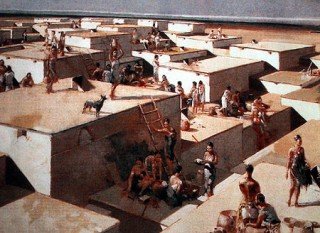
As time has flowed on, the city has conquered its surrounding neighbours, and now holds a substantial territory. The scientific advances that brought it here have begun to slow down as cultural mores and ethos stabilize around tradition.
Hereditary castes may have developed, and there is likely a well established group of rich merchants who are now assisting the rulers in ruling the country.
As there are several cities under control, the rulers may have found that the government systems and culture have become a burden in the smooth operation of the territory – the expansion slows or stops, the borders are set.
The mindset turns to defensive. Peoples in this stage of development don’t think they are masters of all they survey – they know it!
Very self assured, they are driven by honour and duty to the state that brought them to this point, and will build large monuments to their glory. This would be the late expansion period or pinnacle.
Having closed the borders and accepted that they are constrained from further expansion, societies mind turns inward. The sense of pride, surety of purpose, desire to expand that drove the society to this point dissipates.
The rich begin the oppression of the poor to gain more wealth, prestige and power. Crime and violence begin to increase as hedonism begins to overtake the population. The empire looks strong on the outside, but the rulers have become full of hubris, mistrustful of other ways of life, perhaps even mistrustful of each other.
Power plays and politics begin to rip apart the fabric of the ruling system. People born into this environment place the needs of the self above the needs of the soci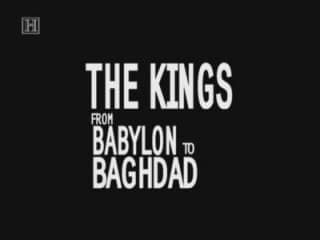 ety, they are ruthless, greedy, untrustworthy. The rulers are oppressive, powerful, ruthless, and narrow minded. In this period our society has crested and is now starting the decline period.
ety, they are ruthless, greedy, untrustworthy. The rulers are oppressive, powerful, ruthless, and narrow minded. In this period our society has crested and is now starting the decline period.
From here, anything can happen, but usually greed and acquisition of power is what rips the society to shreds. Crime increases, social structures and traditions disappear as youths abandon the society that abandoned them.
In the distance, there is a new power rising and the dying empire is jealous of the competing power. A war may start to overpower the upstart and retain primacy. In many cases the war destroys both old power and new, who are conquered by a third power.
Sometimes the old prevails but usually the new will win as the vigor of the new empire in expansion phase brings new ideas and technologies to bear against hubris and arrogance. In the dying empire, the people are arrogant, narrow minded, shifty.
They ‘feel’ the decline and may feel a nameless dread that makes them distrust their own neighbors, intuition, government and culture. The infighting to rule the people becomes more intense as competing powers within the empire jockey for position, possibly leading to severe oppression of the lower classes. We are now at the end stage of society, the next step in sequence is usually collapse.
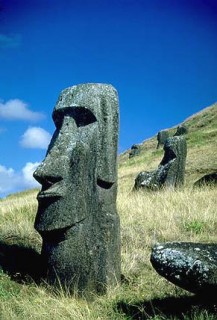
If it hasn’t been conquered yet, competing factions have finally torn apart and collapsed the empire. Violence has replaced culture as the new way of life and gangs pillage with impunity.
Very seldom can a society pull itself back from this period and rebuild although it has been known to happen – China is a good example. In this stage, the people lack even the natural hunter gatherer culture that brought them together, mistrust and greed have done too much damage to the social fabric.
Over time, friends and families who can trust each other will band together for defense against bandits. With no standing army, government, infrastructure, and society in disrepair, the various cities and towns are easy prey for a competing empire – but ruling these people is no easy task due to their now disruptive culture.
We have reached total collapse. In some cases such as Easter Island, the entire area that was once a thriving culture is completely barren of humans – leaving only monuments to their folly.
The above sequence of events is hypothetical, but blended on the historical rise and fall of several empires. In the USA today the evidence of decline should be obvious to any astute reader, and I personally place the USA at the late decline to end stage.
Is there a possibility that the USA can pull back from collapse? I think so, but it will take men and women of courage, principal, and leadership. The task will be dangerous as the parasites that have infected the body politic will organize to defend their interests, probably leading to violence.
For certain, to survive intact, the USA will have to lose the overseas empire and become, for the first time, a true democracy.
Of greater concern than the parasitic politician/financier class is the current social drift that is happening in the USA. The ideals of courage, honor, duty, and social cohesion that drive societies to adapt and survive have been replaced with hedonism, greed, and self interest. No society composed of these disruptive virtues has ever managed to reconstitute itself.
ABOUT THE AUTHOR: Jack JC, is a reserve Officer in a NATO aligned country, he has a Bachelors Degree in Mechanical Engineering and an interest in the strategic effects history and culture bring to present geo-political affairs. As an international travelor he has friends and family serving in both NATO and non-NATO countries and would prefer that his friends and family in both camps not kill each other. He has operated at senior corporate levels of management, and has developed equipment for both civilian and military use.
Read more by Jack JC
Jack JC, is a reserve Officer in a NATO aligned country, he has a Bachelors Degree in Mechanical Engineering and an interest in the strategic effects history and culture bring to present geo-political affairs. As an international traveler he has friends and family serving in both NATO and non-NATO countries and would prefer that his friends and family in both camps not kill each other. He has operated at senior corporate levels of management, and has developed equipment for both civilian and military use.
ATTENTION READERS
We See The World From All Sides and Want YOU To Be Fully InformedIn fact, intentional disinformation is a disgraceful scourge in media today. So to assuage any possible errant incorrect information posted herein, we strongly encourage you to seek corroboration from other non-VT sources before forming an educated opinion.
About VT - Policies & Disclosures - Comment Policy

